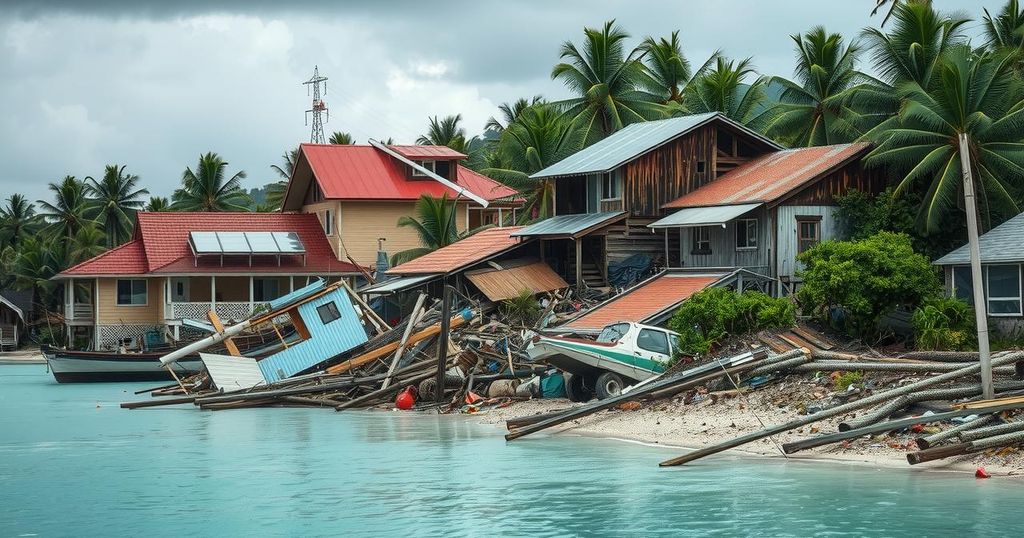Cyclone Chido Ravages Mayotte: Hundreds Feared Dead, Humanitarian Crisis Looms

Cyclone Chido has caused unprecedented destruction in Mayotte, leading to potentially thousands of deaths and extensive infrastructural damage. The French government has initiated rescue operations and provided emergency assistance to address the humanitarian crisis. This disaster highlights the increasing intensity of cyclones due to climate change and underscores the need for international aid.
The French territory of Mayotte has faced a devastating impact from Cyclone Chido, with anticipated fatalities ranging from hundreds to potentially thousands, according to local authorities. François-Xavier Bieuville, the Prefect of Mayotte, indicated that the cyclone induced unprecedented destruction, prompting France to dispatch rescue teams and emergency supplies to the afflicted region. He remarked on the significant challenges in ascertaining precise casualty figures due to the cyclone’s extreme violence, which led to extensive damage to infrastructure and the residential fabric of the island.
Initially reported figures from the French Interior Ministry disclosed at least 11 confirmed deaths and over 250 injuries, with expectations of these numbers escalating significantly. Mayotte, characterized as France’s poorest island with a population exceeding 300,000, sustained the most severe destruction in slum areas predominantly comprising makeshift metal structures. Reports indicated that the cyclone inflicted severe infrastructural damage, particularly impacting the airport and disrupting power supplies.
Cyclone Chido, classified as a category 4 cyclone, recorded wind speeds over 220 kilometers per hour. Following its passage through Mayotte, the cyclone continued its trajectory towards Mozambique, raising alarms for the safety of over 2 million people in the region. Concurrently, the French government, including President Emmanuel Macron, expressed solidarity with Mayotte’s residents amid the unfolding disaster, with emergency efforts mobilizing additional resources and personnel for assistance.
Further complicating the situation, widespread destruction across Mayotte has felled entire neighborhoods and devastated local agriculture. Local resident Chad Youyou shared videos depicting the extensive damage, encapsulating the community’s loss with the poignant statement, “Mayotte is destroyed … we are destroyed.”
Lasting consequences from Cyclone Chido may entail a heightened risk of diseases such as cholera, malaria, and dengue fever, aggravated by stagnant water pools formed during the cyclone. This calamity underscores the broader context of increasing cyclone intensity and frequency attributed to climate change, exposing vulnerable nations like Mayotte to dire humanitarian challenges requiring global attention and support.
Cyclone Chido represents a grave natural disaster impacting Mayotte, a territory that is significantly disadvantaged economically within the European Union. As Cyclone Chido made landfall, it followed a trajectory through regions already vulnerable to climate-related catastrophes, continuing to affect neighboring nations such as Mozambique. Historically, cyclone seasons in the southwestern Indian Ocean yield severe wind events resulting in extensive flooding and landslides, triggering humanitarian crises in poorer regions. Recent cyclones have underscored the adverse effects of climate change, making the need for cooperative international support increasingly urgent.
In conclusion, Cyclone Chido has inflicted catastrophic damage on Mayotte, with local officials estimating that the death toll could reach into the thousands. The French government’s rapid response underscores the severity of the situation as rescue efforts continue amidst widespread destruction. This disaster not only reveals the fragility of communities in the face of natural calamities but also emphasizes the escalating impacts of climate change on vulnerable populations, calling for enhanced global support and humanitarian interventions.
Original Source: www.cbsnews.com








